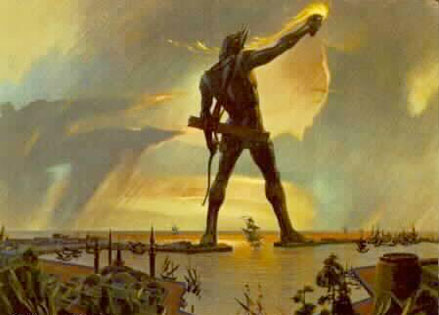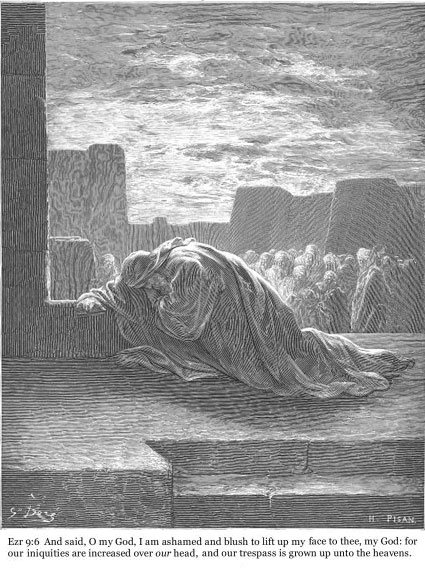Feb
12
2013
 “With this theory of the joke in mind, the final chapter of Nehemiah is holy and hysterical.”
“With this theory of the joke in mind, the final chapter of Nehemiah is holy and hysterical.”
In his book, Deep Exegesis, Peter Leithart speaks of the biblical text as many things, but none is more confronting than his viewing the text as a “joke.” His explanation, however, makes perfect sense. What makes a joke funny? It is either prior knowledge to which not everyone is privy, or a confounding of expectations (which are also based on prior knowledge to some degree). The Bible is full of such jokes, and realizing one is in on the joke is immensely satisfying.
Continue reading
Comments Off | tags: Compromise, Ezra, Hermeneutics, Joke, Literary Structure, Nehemiah, Peter Leithart | posted in Bible Matrix, Biblical Theology, The Restoration Era
May
4
2010

For he is our peace, who has made us both one, and has broken down the dividing wall of hostility, by abolishing in his flesh the law of commandments and ordinances, that he might create in himself one new man in place of the two, so making peace, and might reconcile us both to God in one body through the cross, thereby bringing the hostility to an end. And he came and preached peace to you who were far off and peace to those who were near; for through him we both have access in one Spirit to the Father. (Ephesians 2:14-18)
So, the New Jerusalem—at least the way it is described in Revelation 21—is the culmination of all the “Day 6s” since the original in the Garden of Eden. And, like the walls of water at the Red Sea and Jordan crossings, this entire, miraculous arrangement is held together by the Mediator-Man, the Lamb standing at the centre.
Continue reading
Comments Off | tags: 666, AD70, Ezra, Genesis, Herod, Nehemiah, oikoumene, Revelation, Solomon, Totus Christus | posted in Biblical Theology, The Last Days, The Restoration Era, Totus Christus
Jan
28
2010

36. Acording to Preterists, all those left in Jerusalem were reckoned unholy. But see Isaiah 4:3-4.
Simple answer: Isaiah 4 refers to the “new Jerusalem” of Ezra and Nehemiah. But I’m going to use this as an opportunity to analyse Isaiah 4 and its context. This stuff blows me away.
Continue reading
Comments Off | tags: Bible Matrix, Ezra, Feasts, Isaiah, Jeremiah, Literary Structure, Nehemiah | posted in Against Hyperpreterism, Biblical Theology, The Last Days, The Restoration Era
Oct
30
2009
or How Not to Read the Bible

We moderns have not been trained in how to read texts, let alone ancient ones. Reading texts requires not only an understanding of what is said but an appreciation of how it is said. Consequently, the sacred texts are simply scanned for information that supports what we have already received or they are mishandled entirely. T. David Gordon asserts that this is the reason modern preaching is so disappointing and unengaging. See Why Johnny Can’t Preach and Threshing the Text. We won’t allow the Bible to say anything new.
Continue reading
Comments Off | tags: Church Discipline, Compromise, Hermeneutics, Nehemiah, T. David Gordon | posted in Biblical Theology, Christian Life
Jun
29
2009
James Jordan’s work on the Jew-Gentile oikoumene set up in Daniel has far reaching implications.1 Peter Leithart writes:
“Yoder argues that from the time of the Babylonian captivity, the Jews developed a proto-”free church” model of community life. True in some respects. Jews didn’t have their own polity. But I’ve got doubts if that’s a fair characterization of Jews in and after the exile.
Continue reading
Comments Off | tags: AD70, Archaeology, Daniel, Esther, Exile, Hellenism, Mordecai, Nehemiah, oikoumene, Peter Leithart, Tertullian, Yoder | posted in Biblical Theology, Quotes, The Last Days, The Restoration Era
Apr
16
2009
“Because of Christ we are thought of as fools, but Christ has made you wise. We are weak and hated, but you are powerful and respected. Even today we go hungry and thirsty and don’t have anything to wear except rags. We are mistreated and don’t have a place to live. We work hard with our own hands, and when people abuse us, we wish them well. When we suffer, we are patient. When someone curses us, we answer with kind words. Until now we are thought of as nothing more than the trash and garbage of this world.” 1 Corinthians 4:10-13
So, are God’s people to wear rags? Or should they be dressed well like Solomon or the woman in Proverbs 31? Or is that even the right question?
Continue reading
Comments Off | tags: Adam, Corinthians, Daniel, Ecclesiology, Ezekiel, Ezra, Joseph, Maturity, Mordecai, Nehemiah, Noah, Paul, Proverbs, Robes, Solomon | posted in Biblical Theology, Totus Christus
Apr
10
2009
Why did Nehemiah pull out the children’s hair? Was this just going too far? Recognising Bible patterns is a big help in interpretation.
Continue reading
Comments Off | tags: Compromise, Nazirite, Nehemiah, Zechariah | posted in The Restoration Era
Apr
10
2009

Ezra took a great risk to bring Levites and riches to the Temple from Persia. Mixed marriages were suddenly of more concern, which poses a difficult question. Things seem to be heading backwards—away from the New Testament rather than towards it.
Continue reading
Comments Off | tags: Ezra, Nehemiah, Peter Leithart, Pharisees, Priesthood, Resurrection, Tabernacle, Temple | posted in Biblical Theology, The Restoration Era
Apr
10
2009
“Danger!” the dispensationalist pundits are shouting. “Watch out for replacement theology!” This specter of “replacement theology,” also masquerading under the pseudo-academic moniker “supersessionism,” looms ominously over Christendom. One blogger blogs, “One of the most dangerous and subversive doctrines held by adherents of Preterism, is the view that in A.D. 70, at the destruction of Jerusalem by the Roman armies, God’s covenant nation of Israel was superseded by the Christian church.” A website adds, “There is a demonic cancer coursing through the life blood of the Church of Jesus Christ and its name is REPLACEMENT THEOLOGY.” Yet another puts it bluntly, “This is a heresy . . .” Joel McDermon, Replacing Replacement Theology
Fight terminology with terminology. Throughout the Bible it is clear that God’s priestly nation went through many death-and-resurrection renewals. No one calls those ‘replacements.’ Can you imagine theologians arguing that Ezra’s Temple and Nehemiah’s new Jerusalem were only a temporary parenthesis, and that God would give Israel back their old kingdom?
The same thing exactly happened in the first century. Israel died and was resurrected anew. So, I propose new jargon – ‘Transformation Theology: don’t stay left behind.’
Comments Off | tags: Dispensationalism, Ezra, Nehemiah, Replacement Theology | posted in Biblical Theology, The Last Days, The Restoration Era
Apr
8
2009
“…and I came to Jerusalem and discovered the evil that Eliashib had done for Tobiah, in preparing a room for him in the courts of the house of God. And it grieved me bitterly; therefore I threw all the household goods of Tobiah out of the room. Then I commanded them to cleanse the rooms; and I brought back into them the articles of the house of God, with the grain offering and the frankincense.” Nehemiah 13:7-9
After the failure of Israel’s kings and their adulterous priesthood, God established new worship in the “wilderness” of Babylon under Daniel and Ezekiel. When Babylon fell, He brought His new Jerusalem, like a pure bride, back to the mountain of God.
Continue reading
Comments Off | tags: Apostasy, Compromise, Daniel, Ezekiel, Ezra, Man of sin, Nehemiah, Priesthood | posted in The Restoration Era
 “With this theory of the joke in mind, the final chapter of Nehemiah is holy and hysterical.”
“With this theory of the joke in mind, the final chapter of Nehemiah is holy and hysterical.”




























